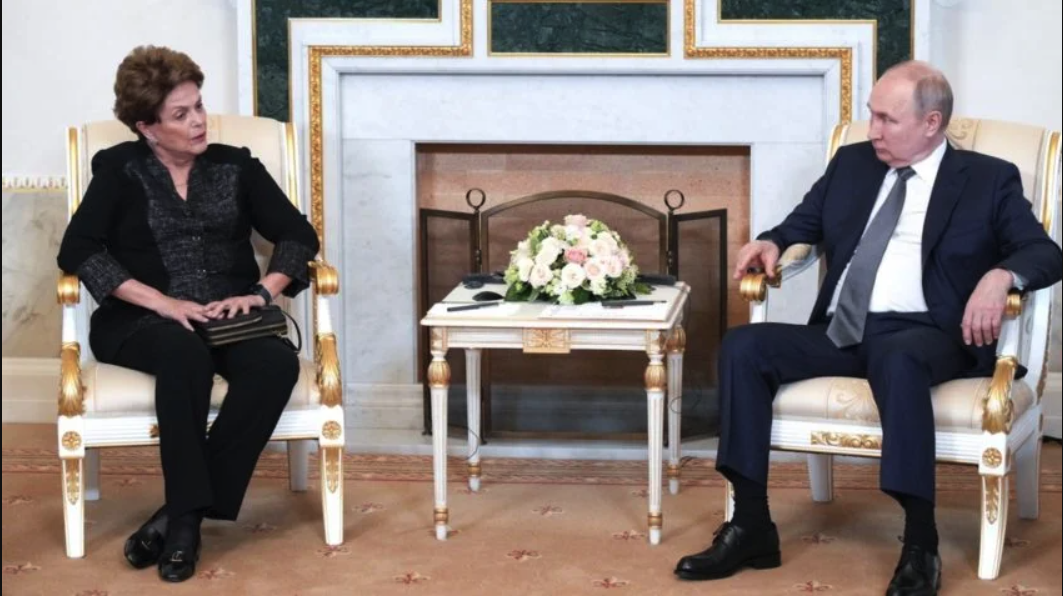
Published 26/07/2023 18:28 | Edited 7/26/2023 7:01 PM
The former Brazilian president and current president of the New Development Bank (NDB) – known as “Banco do Brics” -, Dilma Rousseff, met this Wednesday (26) with the president of Russia, Vladimir Putin.
Dilma follows the activities of the Russia-Africa Summit, an economic forum that brings together several world leaders in Saint Petersburg, and took the opportunity to arrange bilateral meetings with Putin and the president of South Africa, Cyril Ramaphosa.
According to his team, the purpose of the meetings is to discuss the next BRICS Summit, scheduled for August 22nd to 24th in Johannesburg, and themes such as the expansion of NDB members. He also says that he is going to deal with the expansion of the NDB and meet with rulers of other African countries, who are in the Russian city.
“The NDB reiterated that it is not considering new projects in Russia and operates in compliance with applicable restrictions in international financial and capital markets,” says a press release. “Any speculations on such a matter are unfounded.”
Read also: Dilma points out priorities of Banco do Brics for the Global South
Topics under discussion
The expectation is that the meeting between Putin and the African rulers will result in the signing of intergovernmental agreements in the commercial, economic, scientific and humanitarian areas, the Kremlin said in a statement released yesterday (25). They will also discuss the war in Ukraine and the African Peace Initiative, launched in St. Petersburg in June.
One of the main themes of the Russia-Africa summit is Russia’s exit from the grain deal. Putin’s decision, announced last week, interrupted the supply of wheat from Russia and Ukraine to African countries, which are very dependent on the grain exported by both. Since December 2021, Russia has blocked the Black Sea, where Ukraine used to sell its products.
The other important topic is the aftermath of the mutiny promoted by the Russian special forces group Wagner. The group is hired by several African countries to defend them against insurgent armed groups, mainly jihadists. Putin, who sealed a deal with Wagner’s owner, Yevgeny Prigozhin, must ensure that nothing changes in the group’s operations in Africa.
Established to be an alternative to traditional funding sources, the organization includes the group’s members (Brazil, Russia, India, China and South Africa), as well as Bangladesh, Egypt and the United Arab Emirates. There is talk of entering Argentina, Venezuela, Saudi Arabia, Iran and Algeria.
Read also: Goodbye to the dollar: after the Brics, the Middle East advances in de-dollarization
sanctions
Isolated since the invasion of Ukraine, the Russian government has relied on China and India to mitigate the effects of tough economic sanctions imposed by Western Europe and the United States. Putin also sees in the BRICS a good opportunity to find new partners.
International sanctions prevent Russia from receiving direct aid, such as loans from banks like the NDB, so it focuses on the possibility of doing business with other countries, especially in the area of energy (oil and gas), which has been sold at low prices. prices for China and India. The country is also the main responsible for shipments of fertilizers to the Brics countries.
Only 1% of its oil exports were destined for India, before the conflict, reaching 18% in May 2022. Russia also promises to increase the presence of Chinese cars in the country and the opening of stores in an Indian supermarket chain.
Furthermore, along with the other members of the bloc, the Russians have advanced to reduce their financial dependence on the dollar and the euro in international transactions. Russia has the fourth largest foreign currency and gold reserves in the world, which could be used to help support the ruble for a considerable time.
Also read: Economist Elias Jabbour to take over as director of the BRICS Bank
Beijing is Moscow’s main partner and is betting on a friendship speech, while at the same time reinforcing its support for peace and the defense of sovereignty. India has also abstained at the UN on resolutions condemning Russia.
Brazil and South Africa, on the other hand, adopt a more neutral stance, preferring to encourage peace talks between the countries at war. South Africa even authorized Vladimir Putin’s presence at the Johannesburg summit in late August, confronting threats from the International Criminal Court (ICC). Brazil even signed a resolution condemning the invasion of Ukraine by Russia.
Source: vermelho.org.br

